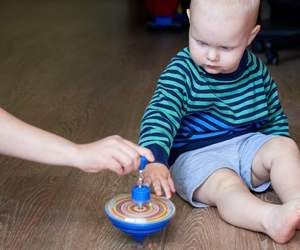
Autism Spectrum Disorder in early years
The first signs of Autism Spectrum Disorder (ASD) can be diagnosed in nursery-aged children. But what is ASD, and how can you support children at your nursery.
Here, Jennifer Warwick, Specialist Speech and Language Therapist, breaks it down for you.
What is Autism Spectrum Disorder?
In order to receive a diagnosis of ASD, a child needs to present with needs in two areas: social communication and restricted and repetitive behaviours. They may also experience sensory difficulties too.
ASD affects around 1 in 100 people in the UK (higher in other parts of the world).
It has been great to see an increase in awareness of ASD in recent years but often budget cuts and long waiting lists can mean that it is difficult for children to receive specialist help early on.

How can you support children at your nursery with Autism Spectrum Disorder?
Supporting communication is a key part of working with any children at your nursery that may have ASD.
Children with ASD have a disordered pattern of communication, so they do not just have delayed development, but their skills are developing in a different way too.
Sometimes you may see a child who knows lots of words but can’t ‘ask’ for the things that they want or a child with no words who doesn’t point or gesture and just cries when they are unable to communicate with you, also known as ‘requesting’. This can be difficult for both you and the child to manage.
Difficulties with ‘requesting’
Difficulties with ‘requesting’ can have a big impact on a child’s levels of frustration and behaviour. Often when I go to nurseries and we talk about ‘requesting’, staff report that the child is very independent and doesn’t tend to ask.
Creating opportunities for a child to ask is a useful way to support ‘requesting’ in your nursery environment.
You can do this by incorporating the following strategies into activities that you are already doing with the child, no extra resources or planning necessary:
Offer choices
- Think about what the child is interested in, as this is an important first step as to what they may like to request
- Offer them some choices, even if you know what the child will choose, offering a choice provides an opportunity for them to send you a message
- Start off by offering a choice between something they want and something they don’t want in order to make the choice meaningful
- Hold up the objects and say the word as you show them e.g. ‘biscuit or apple?’
Offer one at a time
- Offer one at a time and keep a few to see how they communicate that they want more e.g. instead of giving a child all the pieces they need for the jigsaw/train track, just offer a few. You could try this at snack time, offer a few raisins and wait to see how the child sends you a message that they want more
Encourage giving
- Create a chance where a child needs to ask you for something by giving you an item e.g. in a game that they need your help, such as a spinning top. Spin the top a few times to get the child’s interest, once they are interested wait to see how they show you they want more.
- The child may look at you, give you the item, vocalise or use a word. All of these attempts to communicate are positive; you can create a chance for the child to communicate across the day in activities they are interested in.

More support with Autism Spectrum Disorder
In my experience as a speech and language therapist (SLT), early years teams have a huge role and very important contribution to make in supporting children with ASD.
There are often high expectations on a nursery team to deliver support and interventions to children with ASD, with a lack of resources and training. To support your team, I have written a manual specifically for early years settings with guidance and activity ideas.
This blog post was written by Jennifer Warwick, Specialist Speech and Language Therapist.
- SEND
Similar Articles
STEMinists in the making: Encouraging girls’ confidence in science

Early years activity: Pancake creations

Autism Awareness training for nurseries
An introduction to a range of strategies to support ASD in nurseries. Course details Duration: Half day Who should attend: This course is suitable for all early years practitioners. What will I learn This introductory course for nurseries will provide a range of strategies to support ASD. The training will develop knowledge and awareness of…

